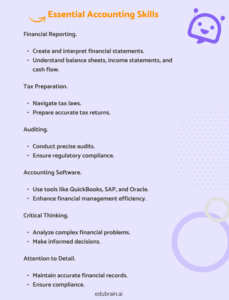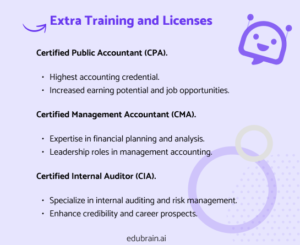Solving a math equation is a fundamental skill in mathematics. It involves finding values that make an equation true, a...
The Difference Between Finance and Accounting
Choosing a major in business often involves deciding between finance and accounting. While they may seem similar, there are distinct differences between the two.
This article compares accounting to other business fields. It concentrates on career opportunities, skills, and industry demand.
Table of Content
ToggleAccounting as a Potential Major
Accounting studies how businesses track their income and assets over time. This field involves detailed record-keeping. The accountants analyze financial statements and ensure compliance with financial laws. For students who find the coursework challenging, using an accounting homework solver can be a valuable resource to help understand complex concepts.
The backbone of accounting includes:
- Financial Accounting;
- Managerial Accounting;
- Auditing;
- Taxation;
- Business Law.
These subjects teach you to understand how financial systems operate within various organizations. Accounting students also often receive additional software training. It’s critical for their flexibility in the modern corporate environment.
Key Job Opportunities
Accounting offers diverse career paths. Many accountants also move into managerial positions, overseeing financial operations and strategic planning.
Here’s the scope of the main career roles for accountants to pursue:
| Accounting Field | Job Opportunities |
| Public Accounting | Auditors, tax consultants, forensic accountants, financial analysts. |
| Private Accounting | Financial managers, controllers, CFOs. |
| Government Accounting | Budget analysts, auditors, and compliance officers. |
| Non-Profit Accounting | Grant managers and financial officers. |
Additionally, for students struggling with specific finance concepts, a finance questions solver can be a helpful tool to clarify doubts and reinforce learning.
Earning Potential for New Graduates
Salaries for accounting graduates can be quite attractive. Entry-level accountants can expect the growth of their salaries with additional certifications. The Bureau of Labor Statistics stated that the median wage for accountants was $79,880 in May 2023.
Several factors influence the salary potential for accounting professionals. For example, accountants in major metropolitan areas often earn higher salaries.
Working in the accounting field can lead to higher earnings. For example, forensic accountants and CPAs command higher salaries than general accountants.
Basic Skill Set for Accountants
An accounting program develops a wide range of skills:
- Financial Reporting: preparing and interpreting financial statements.
- Tax Preparation: navigating complex tax laws, ensuring compliance.
- Auditing: verifying the accuracy of financial records and ensuring regulatory compliance.
- Accounting Software: hands-on experience in QuickBooks, SAP, or Oracle.

Hiring Demand for Accountants
The growth of global business drives the need for skilled accountants. Every organization needs professionals to manage finances and provide accurate financial reports. This constant demand offers strong job security for accounting graduates.
Globalization has increased the complexity of financial transactions. As a result, it raises the need for skilled accountants. Today, accountants navigate the financial systems of international trade, mergers, and acquisitions.
Regulatory requirements, such as the International Financial Reporting Standards (IFRS), also increase job demand. These regulations help businesses to maintain transparency and rigorous financial controls.
Accounting and Other Related Majors
| Aspect | Accounting | Finance | Business Administration | Economics | Marketing |
| Focus | Financial record-keeping, compliance | Investments, financial markets | General business operations, management | Economic theories, policies | Market research, consumer behavior |
| Career Paths | CPA, auditor, financial analyst | Investment banker, financial planner | Manager, consultant, entrepreneur | Economist, analyst, researcher | Marketer, brand manager, market researcher |
| Skills | Financial reporting, auditing | Financial analysis, risk management | Leadership, strategic planning | Economic analysis, quantitative skills | Marketing strategy, communication skills |
| Job Demand | Stable demand across sectors | High demand in finance and banking sectors | Versatile, applicable in all industries | Varied demand in research, policy sectors | Demand in consumer goods, services sectors |
| Salary Level | Competitive, potential for growth | High potential with experience, certifications | Varied, influenced by industry and role | Research-focused, potential for growth | Varied, influenced by industry and role |
| Education | Accounting principles, tax laws | Financial markets, investment strategies | Business operations, organizational behavior | Economic theories, policy analysis | Consumer behavior, market trends |
| Certifications | CPA, CMA, CIA | CFA, Series 7 | None is required, but an MBA is common | None required, but can enhance prospects | None required, but can enhance prospects |
Educational Needs for Accounting
A bachelor’s degree in accounting or a related field is typically required to pursue a career in accounting. Coursework includes financial accounting, managerial accounting, auditing, taxation, and business law. Internships also provide an invaluable practical experience.
Some students may choose a master’s degree in accounting or an MBA. Indeed, graduate programs often lead to more advanced career opportunities.
Besides formal education, hands-on experience is critical at the very beginning. This includes hands-on training and exposure to real-world financial practices. As a result, graduates become attractive to potential employers.
Extra Training and Licenses
The following professional certifications are applicable for accounting professionals:
- CPA (Certified Public Accountant): for accountants who have passed a rigorous exam. CPAs provide various services, including auditing, tax preparation, and financial consulting.
- CMA (Certified Management Accountant): focuses on financial planning, analysis, and decision-making.
- CIA (Certified Internal Auditor): specializes in internal auditing. They evaluate and improve how well organizations manage risks, controls, and governance processes.

Career Growth Opportunities
Accounting offers exceptional opportunities for long-term career growth. Junior accountants can advance in their positions with more experience. Over time, they start overseeing more complex tasks and larger teams. They can become senior accountants, financial managers, or chief financial officers (CFOs).
As a result, experienced accountants may ascend to executive roles like controller or CFO. Advanced education and constant professional development are indeed critical for the top roles.
Major Challenges of Accounting
While accounting offers many benefits, it also comes with the following challenges:
- Detail-oriented work: especially during tax season or financial audits.
- Regulatory changes: for example, ongoing education and adaptability.
- Competitive field: requires strong performance and continual skill enhancement.
Practical Uses of an Accounting Degree
In corporate settings, accountants manage day-to-day operations. They ensure compliance with financial policies through internal audits.
In non-profit organizations, accountants manage funds from donations and grants. They check if the costs follow donor restrictions. They also prepare financial reports to prove the organization’s financial health to stakeholders.
In government roles, accountants oversee the use of public funds. They work on financial statements and conduct audits to prevent fraud.
Concluding: See If Accounting Suits You
Choosing accounting as a major can be wise for those with a strong interest in numbers, attention to detail, and analytical thinking. The field offers excellent job security, diverse career opportunities, and attractive salary potential.
Considering the challenges and preparing for ongoing learning and professional development is essential. If you are ready to embrace these aspects, accounting can be a rewarding and fulfilling major.
Latest Articles
Discrete math forms the foundation of mathematics dealing has numerous real-world applications, particularly in technology. Consider its role in cryptography,...
Biology and science stands out among academic subjects due to its reliance on memorizing vast amounts of information and understanding...